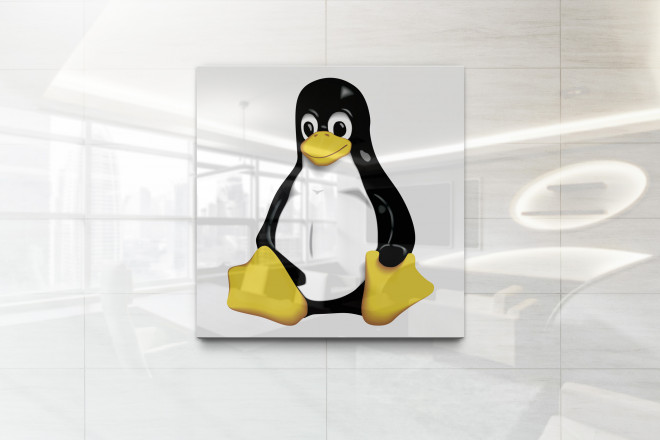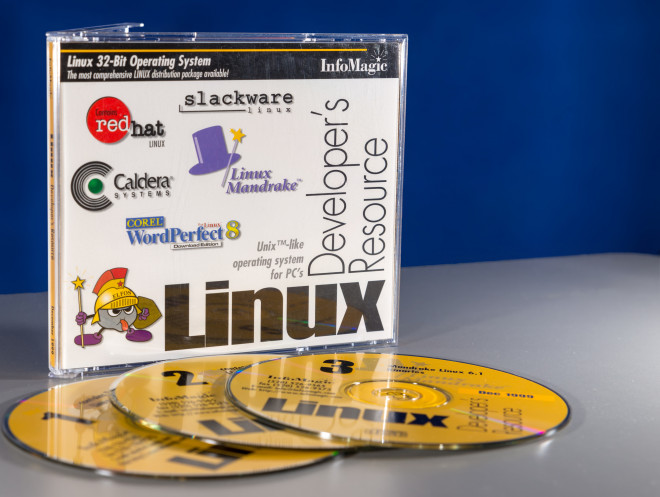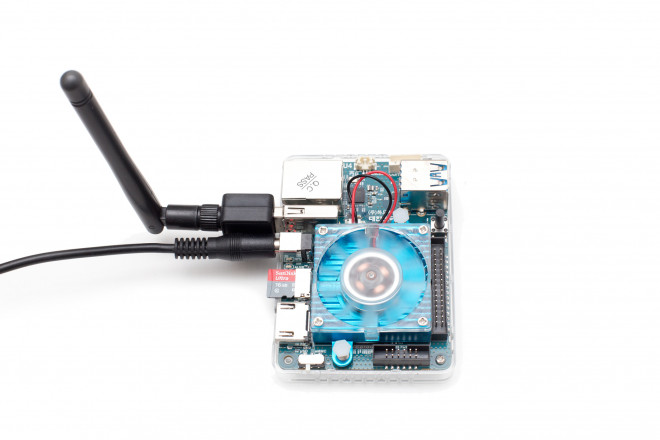Even though we are a company with a clear focus on Windows, Linux certainly deserves flowers on its 30th birthday! After all, its influence on computer science in general and all of our lives in particular cannot be overstated. Whether you're enjoying the onboard computer in your car, your "smart" TV or this blog article on your Android device, Linux (or its derivatives) is running the show. Even Windows users frequently benefit from standards, features and ideas born in the multitudinous Linux community.

The beginnings were humble, "I'm doing a (free) operating system (just a hobby, won't be big and professional)," posted Finnish student Linus Torvalds in 1991 on a Usenet board. He didn't have the foggiest idea that millions of computers would one day be using a future incarnation of the OS that would even carry his name. Linus thought of names like "Freax" or "Buffix" (the "x" was apparently considered extremely hip) but his admin released the first version under "Linux" and started the revolution. And part of the fascination around Linux stems from the slightly eccentric and aloof aura surrounding Linux developers. There are no "rock stars" like Steve Jobs, Steve Wozniak or Bill Gates, most of the masterminds behind Linux are completely unknown to the public. Torvalds considers himself a nerd with great math and physics but rather meager social skills. It's a set of attributes many users can easily identify with.
The initially just 10,000 lines of code quickly sparked an international phenomenon after Linux adopted the GNU General Public License in 1992. This allowed users to participate in its development and to use the OS in a commercial setting. And even though Torvalds continued to play an active role, Linux wasn't a one-man-show but a mass movement with a clear political statement. For many, Linux stood against the commercialization of the digital world and against technological monopolies. Naturally, this made some commercial software developers fairly nervous. This insecurity became especially apparent when, in 2001, Microsoft CEO Steve Ballmer branded Linux "a cancer that attaches itself in an intellectual property sense to everything it touches". To be fair, he wasn't denouncing Linux in general but used it as an example to point out his perceived flaw in the GNU's General Public License: The idea that any use of GPL-licensed code would lead to the new code falling itself under said license. So was this the end of pay-to-use software? Hardly! In any case, Linux proved extremely versatile with support for various architectures beside the dominant x86 hardware and this definitely instilled fear in some commercial developers. Today, Microsoft are themselves using Linux on many of their servers.

Windows and macOS still have their uses but Linux has many advantages: The code is open-source and therefore highly malleable and adaptable to help developers achieve their goals efficiently. That's why, today, many programmers not only work on Linux in their spare time but also as part of their jobs at major companies, helping to better tailor Linux towards commercial use. Another one of Linux's success secrets is its high degree of modularity: Linux runs on anything from supercomputers down to tiny heart rate monitoring smartwatches with barely any memory or processing power. Linux can drive technologically-limited door opening systems just as well as complex control systems of industrial production lines because developers simply pick and adapt the modules they need. In addition, there are numerous ready-to-use distributions (or distros, as Linux users lovingly call them) that come with extensive software libraries geared towards specific uses cases.
In terms of usability, Linux has come a long way. Back in the 90s when I installed my first Linux distribution called Debian, the experience was somewhat patchy, mildly put. It stayed this way for many years– and earned Linux users the image of long-haired fast-food lovers with a penchant for system administration. Without the all-powerful terminal, and a slew of cryptic commands, you were basically helpless. The (exemplary) security concept was another hitch/annoyance, especially for Windows users: While Windows let you get away with anything (including self-inflicted system damage), Linux adopted a safety first approach! As my former lecturer put it, "With Windows, all windows and doors are basically open. With Linux, everything is nailed down and there's a mousetrap in every drawer." Diving deeper into the system meant obtaining elevated privileges often guarded by password prompts–a no-no for Windows users back in the day but now common place even with Microsoft software. Modern distributions, like Ubuntu or Linux Mint, hide the rough underpinnings under smooth nifty fully mouse-controlled interfaces that offer a user experience on par with Windows systems.
 Linux also runs well on modest hardware
Linux also runs well on modest hardware
Still, Linux as a desktop system has only garnered a 2.4% market share compared to 73% for Windows and 15.4% for Apple devices. The reasons are many: Linux is still haunted by its "complicated past" that acts as a deterrent. On top, many important applications, like Photoshop, MS Office and, especially, games, are absent and cutting-edge hardware frequently acts up or doesn't work at all due to a lack of driver support. And while terminal commands are no longer a must, they are still around. As for software, there are alternatives to most popular unsupported applications but they usually require some getting used to. Beginners will likely take some time to settle into the Linux universe and to track down suitable information sources. As for me, it certainly took some time to develop a feel for Linux and, frankly, it never became my go-to operating system. It's excellent for servers, great for Android and welcome on some media players but it's definitely not my favorite desktop OS. I usually run multi-boot environments that allow me to quickly switch between Windows and Linux– with most of my time in Linux happily spent configuring software, not using it productively. This seems to be the case for many users, although Linux is gaining ground.
Talks with my colleagues revealed that many are Linux fans at heart, have been for many decades and learned to love "their" distro through hours of passionate online discussions with other user Linux users. The advantages and disadvantages between available desktop environments, like Gnome and KDE, can easily fill hundreds of forum pages. After all, an operating system that strives on the passion and participation of its users is something special. Many don't just use Linux, they "are" Linux! After 30 years, Linux is going stronger than ever and, not least to the "internet of things", millions of new Linux-powered devices come out every day. Babycams, smart washing machines with app support–Linux is ubiquitous. Linus Torvalds' original small vision has grown into a major driving force behind modern technology and our information-based society as a whole. Whether you "are" Linux or not, chapeau Mr. Torvalds and happy birthday Linux!
What I would like to know: Have you tried Linux yet?




Whilst it is true that Linux has its limitations regarding the more popular apps as used on Windows and Mac machines it has something that the other operating systems fail on. Until recently (2020) I was installing Linux Mint on several desktop computers that would otherwise be dumped on landfill sites. Because the internal hardware was unsuitable for Microsoft's latest version of Windows those desktops were redundant. And of course, you'd be lucky to find a Mac OS that could be installed on any computer other than those specifically built for it. So, from an environmental standpoint, Linux Mint had come to the rescue. If for all intents and purposes the user only used the desktop for internet activities and emails it suited their purpose. Added to that, Libre Office was as easy to use as earlier versions of Microsoft Office and you could comfortably edit and save a Word Document in that environment. Naturally, I was happy to give those desktops I'd converted freely to anyone who could not afford to purchase a Windows or Mac desktop ... it was my contribution to protecting the environment.
I would like to point out to Daithi O Buitigh that
whilst it is true that Gentoo is arguably the most
complicated Linux Distro so far created there does
exist a much simplified version of it which is ideal
for beginners-this is none other than Chrome/Chromium
OS- it incorporates within it elements from Ubuntu and may aptly be considered as 'Ubuntufied Gentoo'.
One may well see this as somewhat like what happened when Puppy OS began to base itself on Ubuntu
[though here a minority of Puppy users refused to be so
ubuntufied and continued to base their system on Slackware].
Linux is definitely the name of a Kernel but it is also the
generic name for any OS comprising such a Kernel whether it is GNU-Linux or Android-Linux.
I illustrate with my own experience --when I got a Tablet in
2012 it was Android-Linux but as soon as I got a desktop in
2015 it was always GNU-Linux-the distro I am using at present is the Modicia version of Xubuntu [ that is Ubuntu [with the XFCE Desktop]
Now given that Sven Krumrey prefers Android-Linux has he ever considered downloading from blissos.org onto a
desktop ? Do have a look at it on distrotest.net !
I always have Linux on some computer, but I'm no fan. Tails OS works flawlessly for what it's intended, but it's the only one. Linux Mint is out of the desktop OS that has worked the best for me, but there's always issues with them. Maybe if Ashampoo did some apps, screenshot program Snap would be a great addition to the Linux market, there isn't one screenshot program that works for Linux they all terrible.
Hello,
like many other user let me ask why is the installation not made foolproof ? And why is it not working virtually. It would be great to habe a working Linux ( maybe Ubuntu or Mint ) virtually, just with one click to run on the windows platform, without switching the computer out and on ? I tried Ubuntu virtual, but than it was running only with a small window and suddenly dissappeared even.
I've only experimented with Linux with Oracle's VirtualBox which makes it easy to try different distributions without committing yourself to dual boot. I'm not a gamer so I don't care about a lack of games but until mainstream applications like Quicken and perhaps a non-geeky backup product (I use Macrium Reflect under Windows) are available Linux will just be a curiosity for me. I'm not at all happy with the intrusive direction Microsoft is going with Windows 10 and 11 but for me, it's the only game in town...for now.
Rob
By nature, I am one who likes experimenting with new or unusual software just to see how it works and if I can use it for my daily tasks. The problem with Linux from my standpoint is that there are many confusing versions of so-called Linux software packages that I just say 'forget it', I can accomplish what I need to do with Windows.
Exccellent article...Thanks
First of all, I need to point out the 'Linux' actually only refers to the kernel and not the entire OS. Strictly speaking it#s 'Gnu/Linux'
I use Gentoo (a bit more complicated to install but thereare a lot of 'off the shelf' distros around that will set everything up (including partitioning the hard drive - you just follow the prompts.
As for software - sure, the big names aren't there - but you can use GIMP instead of Photoshop, LibreOffice, in place of MS Office (and both the Linux apps can read from the Windows files and even write in their format (both GIMP and LibreOffice are available free in 'doze format too). Games are the only real problem but thereare a couple of Linux apps that will alow some to be accessed - WINE and Lutris are two of those. There is an excellent flight sim - FlightGear (which is also available for the hard core Windows fanatic)
Even official linux sites now take a more relaxed stance and officially call Linux an operating system. :)
"What is Linux? Just like Windows, iOS, and Mac OS, Linux is an operating system." (https://www.linux.com/what-is-linux/)
Linux has rescued me many times.
Thank you for the history lesson on Linux. I have been aware of Linux ever since I got my first Windows computer and started experimenting with Linux about 10 years ago.
6 months ago I set up Linux Mint Cinnamon as a dual boot with Windows. I am not really that computer savvy and have made a lot of mistakes (thank goodness for backups) but I am to the point now where I am making Linux my primary OS.
With Quicken, my password manager, and my email client not being available in Linux, I had to search for alternatives but in the end I like the alternatives better than the ones I had before.
I do plan on keeping Windows for the time being since I want to see how Windows 11 acts (I have installed the Developers Preview) but I'm not seeing much change for how I use it.
I guess you could say I am now a Linux convert.
I tried Ubuntu back in 2012 but didn't really like it. Next up was a test of Zorin OS, but that didn't work nearly as flawlessly as the many reviews suggested. I abandoned Linux (except for reading about the various distros) until last year when I used the Windows Setup of Q4OS. That went so well, even detecting "problem" hardware, that I now dual boot between it and Windows 7. There's still a lot I don't understand about Linux in general, but Q4OS is working well enough for me to use it almost daily.
It would be nice if you supported Linux too